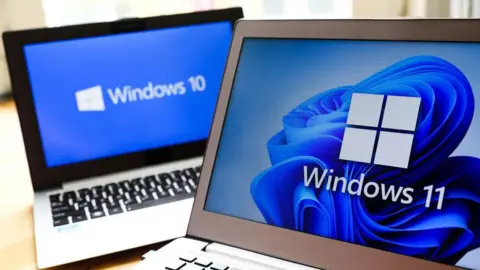Windows 10 users urged to prepare for Microsoft pulling support

Imran Rahman-JonesTechnology reporter and
Liv McMahonTechnology reporter
 Getty Images
Getty ImagesThere is a big change coming for many people who use Windows computers.
Microsoft is ending support for its Windows 10 operating system, which means from Wednesday 14 October, these computers may be at risk.
This is because security updates will stop, making devices more vulnerable to attack.
Microsoft is encouraging people to upgrade for free to Windows 11 – but not all computers will be able to do that.
“The end of support for Windows 10 is shaping up to be a disaster for both consumers and the environment,” said Nathan Proctor, senior director at US consumer group PIRG.
So, what does it mean for you?
Who is affected?
Windows is the world’s most popular computer operating system, with Microsoft saying it is used on over 1.4 billion devices around the globe.
Around 43% of these were using Windows 10 in July 2025, according to Statcounter.
In the UK, consumer guide Which? estimates there could be 21 million people still using Windows 10.
In September, it ran a survey which found about a quarter of those users were planning to continue to use it even after Microsoft’s official support ends.
About one in seven said they planned to buy a new computer.
Other consumer groups have criticised the end of Windows 10 support, saying it will lead to unnecessary spending and environmental waste.
“People are tired of living in a world filled with short-lived devices we can’t fix, or lose software support or are otherwise forced into the waste stream,” said Mr Proctor, who campaigns for the right to repair in the US.
He added: “We deserve tech that lasts.”
What do I need to do?
Microsoft is essentially giving personal users two options: Update to Windows 11, or sign up to receive extended security updates for 12 months.
These can be done in the “Privacy and Security” section of your settings.
People who own PCs eligible for Windows 11 can upgrade for free.
However, many people “will have to purchase new devices – despite the fact that their current computers work just fine,” said Mr Proctor.
If you don’t want to upgrade straight away, or your device is too old for Windows 11, you can sign up to a scheme which will continue the most important security updates until October 2026.
This is called Extended Security Updates (ESU) – but it does not offer any technical support or other software updates.
To get it for free, you will need to have updated to the latest version of Windows 10, have a Microsoft account and back up your PC settings.
Otherwise, you have to pay a $30 (£22) fee or use 1,000 Microsoft Rewards points to access ESU.
For commercial organisations using Windows 10, it will cost $61 per device.
The exact amount you pay depends on where in the world you live.
 Getty Images
Getty ImagesWhat’s changing?
Since its release in 2015, Microsoft has kept Windows 10 going with frequent software updates.
These have been used to tweak or add new features, as well as patch security issues and bugs.
The company recommends users upgrade to Windows 11 for free – but some older devices won’t be able to run the new operating system.
It is also making it harder to use Windows 11 without a Microsoft account – and one way to extend the life of your Windows 10 machine also requires a Microsoft account.
Some users prefer not to log in with a Microsoft account for privacy reasons.
What’s the risk?
Microsoft will stop sending critical security updates and fixes to Windows 10 PCs.
That can make your device more vulnerable to threats such as viruses or malicious software – as you won’t get the latest defences against attacks.
We have seen a number of high-profile cyber-attacks in recent months, to businesses ranging from retailers to car manufacturers and even a nursery chain.
Companies may also “find it challenging to maintain regulatory compliance with unsupported software”, Microsoft Consumer Chief Marketing Officer Yusuf Mehdi wrote in a blog post.
You may also notice other software could lose some functionality as developers stop sending their latest features to older operating systems.


